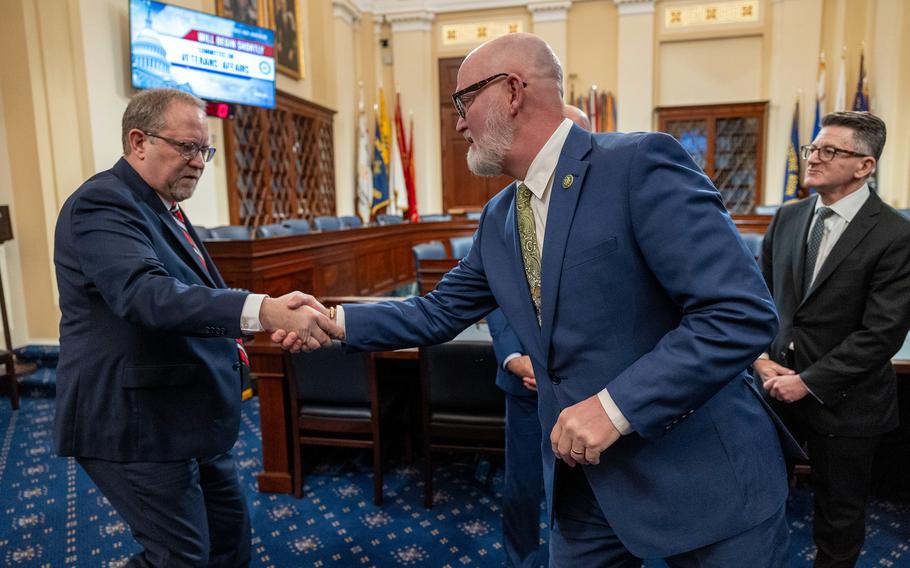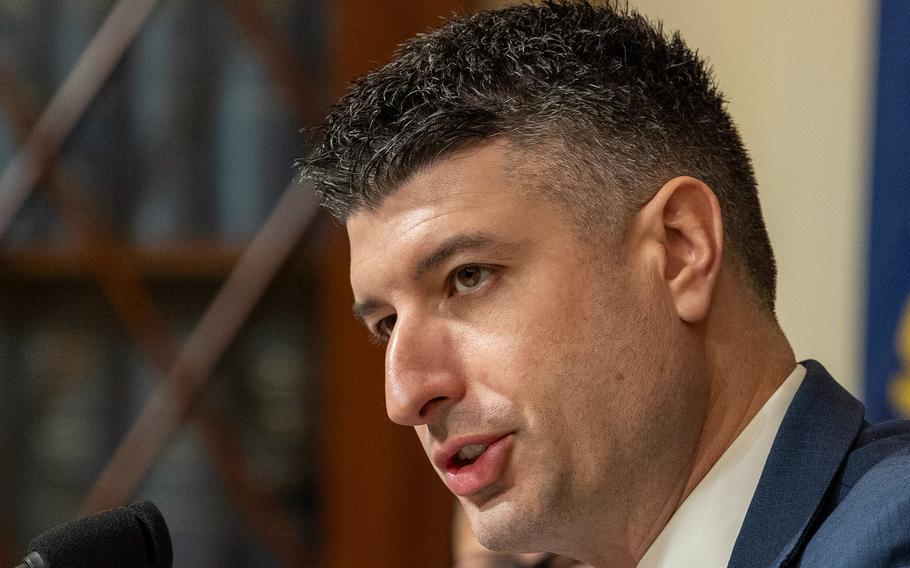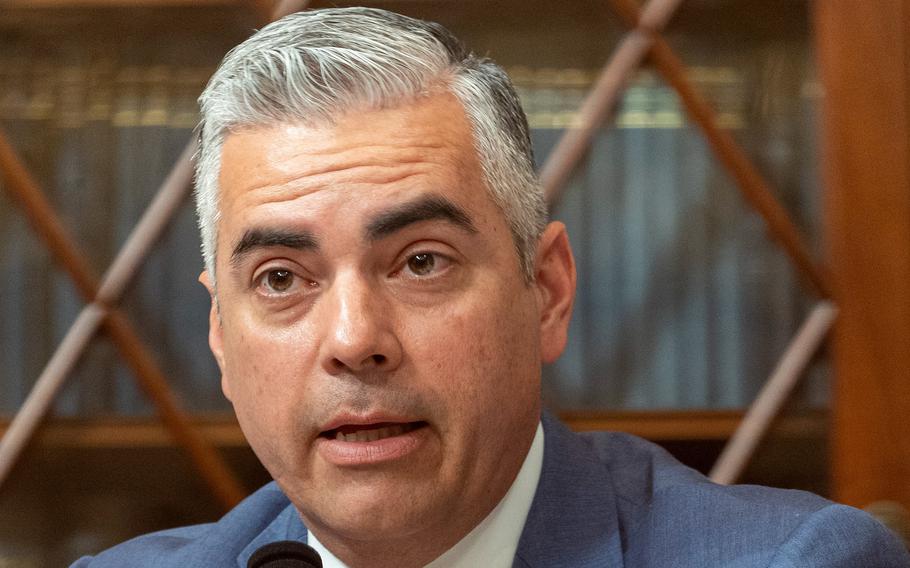
Rep. Derrick Van Orden, R-Wis., center, greets James Ruhlman, left, and Ken Smith, right, from the Department of Veterans Affairs on Tuesday, Feb. 11, 2025, during a hearing of the House Veterans’ Affairs Committee’s subpanel on economic opportunity. (Eric Kayne/Stars and Stripes)
WASHINGTON — Republican lawmakers blasted Department of Veterans Affairs officials for mistakes in administering the GI Bill that led to delays in rolling out its digital platform and delivering direct deposits to veterans to help pay for books and student housing.
Problems in managing operations at the VA’s educational services are the result of the agency prioritizing its large bureaucracy over veterans, Rep. Derrick Van Orden, R-Wis., said at a hearing of a House Veterans’ Affairs Committee’s subpanel on economic opportunity.
“We on this committee are going to make sure that every dollar allocated by this Congress goes to help a veteran and not a bureaucrat,” Van Orden said Tuesday, as lawmakers examined “bureaucratic barriers” to administering the GI Bill during a 90-minute hearing.
Established in 1944, the GI Bill helps veterans and their families cover bills for higher education and training that lead to new jobs and careers.
Van Orden said the work by former VA Secretary Denis McDonough, who left office in January, to improve educational services and other programs for veterans was undermined by “a lot of career officials at the VA.” The agency employs nearly 475,000 people.
“This is going to stop. I am excited to have a new veterans affairs secretary,” Van Orden said, referring to Doug Collins, an attorney, pastor and Air Force Reserve chaplain confirmed by the Senate last week.
The VA is in the process of implementing a modernized GI Bill digital platform to make it easier for veterans to apply for and receive their benefits. A 2024 report by the VA Office of Inspector General found a lack of planning had led to delays and higher costs for the platform.
Van Orden and other lawmakers also rebuked the VA for intimidating colleges and job training programs through so-called risk-based surveys conducted to ensure their compliance with federal regulations when participating in the GI Bill benefits. Some schools withdraw rather than go through the reviews, Van Orden said.
Ken Smith, acting executive director for VA’s education service, said the department does not try to target specific schools for the risk-based surveys but strives to ensure veterans are receiving appropriate education and training.

Rep. Tom Barrett, R-Mich., comments Tuesday, Feb. 11, 2025, during a hearing of the House Veterans’ Affairs Committee subpanel on economic opportunity. Barrett criticized the Department of Veterans Affairs for having technology systems that go over budget and fail to deliver. (Eric Kayne/Stars and Stripes)
“It is not our goal to drive schools out of the market,” he said.
The Defense Credit Union Council in written testimony urged the VA to modernize its electronic payment processing system and improve communications with financial institutions when there are direct deposit errors in the system.
The council, which represents not-for-profit, member-owned financial cooperatives that provide financial counseling, direct deposit services, loan programs and educational workshops, said the VA needs to speed up the transmission of payments for tuition assistance, books and housing.
Jason Stverak, chief advocacy officer for Defense Credit Union Council, described the role of defense credit unions as helping veterans manage their benefits, including for tuition assistance, VA home loans and disability compensation.
Veterans are experiencing delays in receiving disability and GI Bill benefits when using VA direct deposit, which should make the delivery of payments go faster, he said.
Smith said the VA is focused on completing the digital platform for administering benefits through the GI Bill.
About half of original claims are now submitted electronically, the VA said. Nearly 75% of supplemental claims are completed online.
The VA processed nearly 2 million claims in fiscal 2023, according to the VA.
Van Orden also referred to a closed-door session of a House VA subcommittee hearing Monday that identified “billions of dollars in waste that VA is responsible for because of inadequate planning or no planning at all.”
Though Van Orden did not identify the subcommittee or topic, he said the subcommittee chairman is Rep. Tom Barrett, a freshman Republican lawmaker from Michigan. Barrett is the new chairman of the House VA Committee’s subpanel on technology modernization.
Barrett criticized the VA for “IT systems that go exponentially over budget and fail to deliver. We ask questions and don’t get specific answers.”
He described a “rinse-and-repeat cycle” that VA leaders goes through after every election with new House VA Committee members who raise the same concerns.
“The institutional members of VA wait us out,” said Barrett, a 22-year Army veteran.
But Smith emphasized gains the VA has made in improving educational services.
“I commit to you I will work to get it right,” he said, adding he has been in his position for just one week.

Rep. Juan Ciscomani, R-Ariz., talks to witnesses on Tuesday, Feb. 11, 2025, during a hearing of the House Veterans’ Affairs Committee’s subpanel on economic opportunity. Ciscomani expressed concern about progress at the Department of Veterans Affairs in advancing financial assistance for veterans pursuing their commercial trucking licenses and taking information technology courses. (Eric Kayne/Stars and Stripes)
Smith said the VA is focused on making continuous improvements and leveraging technology to ensure veterans have “customer experience excellence.”
Digital modernization efforts launched in August 2022 enabled education claims to be submitted electronically for the first time, he said.
Rep. Juan Ciscomani, R-Ariz., asked about the VA’s progress in advancing financial assistance for veterans pursuing their commercial trucking licenses and for taking information technology courses, also known as VET-TEC, that will lead to jobs in high-demand fields.
“Transition from the military looks different for every person out there,” Ciscomani said. He called on the VA to bring a sense of urgency to implementing these programs.
Smith acknowledged the VA’s education service needs better processes and procedures.
“We can look at technology as an enabler,” he said. “We are not there right now. We need to look at things within our control, provide reinforcement and improve our learning curve.”